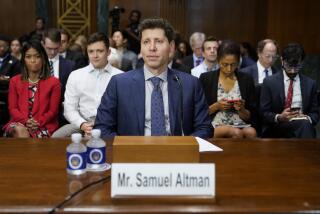Breakup of the Founding Trio Now Overcome
- Share via
When Albert Wong resigned from AST Research in November, 1988, the event rattled the company’s romantic image as a harmonious computer maker founded by three entrepreneurial immigrants who shared a Three Musketeers-like philosophy.
The breakup of AST’s three founders--Wong, Safi Qureshey and Tom Yuen--was a watershed event in the company’s 10-year history. But 16 months later, all three acknowledge that the parting was probably for the best.
“There’s a tendency for people to be romantic and nostalgic about partnerships,” says Yuen, AST’s co-chairman and chief operating officer. “Sometimes it is not so fairy-tale-like.”
In the beginning, at least, it did seem like the stuff of high-tech dreams. Wong, Qureshey and Yuen founded AST in 1980 during a series of lunches at a Carl’s Jr. restaurant in Irvine. They named the company using the first initials of their first names: Albert, Safi and Tom.
In those days, the three young Asian engineers had grown weary of working within a corporation and shared a common ambition to strike out on their own. They founded AST by pooling $12,000 in cash and $28,000 in equipment, setting up shop in Yuen’s garage.
The company piggybacked its way to millions on the success of the IBM Personal Computer, which was introduced in 1981. Weeks after IBM’s computer hit the market, AST came out with a circuit board to boost the memory of the IBM machine. Within a few years, AST had generated revenue of $100 million by selling so-called add-on boards for PCs made by IBM and other manufacturers. In 1986, AST began making its own PCs.
A decade after the company’s founding, Qureshey and Yuen sat in their offices in AST’s shimmering new $30-million headquarters in the prestigious Irvine Spectrum office park and spoke nostalgically about the old days.
“Some people wait for fortunes to befall them,” Yuen recalled. “But we worked hard.”
As AST has grown larger, the company has abandoned the regular pancake breakfasts and companywide meetings with the founders that marked its early days. Wong, who has started a new computer firm in Irvine, said he misses the 16-hour workdays and the excitement of risking homes and possessions to make AST a success.
“The culture changed dramatically through the years,” Wong lamented. “You could no longer walk up to every employee and expect to be recognized.”
Qureshey and Yuen remain touchy about the subject of Wong, who left in a moment of anger that released tensions built up between the partners over years. Wong said it became evident that he was constantly in conflict with Yuen and Qureshey, and he noted that AST has been able to move much faster since he left.
None of the founders regret Wong’s departure, and Wall Street analysts believe the company remains in capable hands.
“This company is big enough to survive and flourish beyond the point when a founder leaves,” said Benny Lorenzo, an analyst for Volpe, Covington & Welty in San Francisco.
Despite a “few negative feelings,” Yuen and Qureshey said they view the parting as amicable. They talk several times a year, but Wong, who has sold most of his stock in AST, says no one has “broken the ice” on re-establishing their friendship, in part because they cannot exchange information about their companies.
“I’m not mad at them, and I don’t think they’re mad at me,” Wong said. And he has what he called a “selfish hope” that they’ll make it to the top ranks of the PC industry. “As long as they don’t change the name,” he said, “I’ll always have the ‘A’.”




